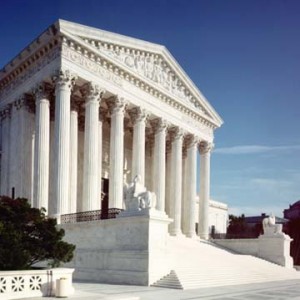Family Research Council and several allied organizations filed an amicus brief with the U.S. Supreme Court in the case of Trinity Lutheran Church v. Pauley, which will decide whether a church can be excluded as a government program recipient just because it is a church.
Trinity Lutheran Church operates a school with a playground connected to it, and wanted to refinish its playground surface to make it safer for the children who played there. It applied to a Missouri state program offering grants to refinish such playground surfaces, and although otherwise qualifying to receive the grant, was excluded because it is a church. With the help of the Alliance Defending Freedom, Trinity Lutheran Church brought suit but unfortunately suffered adverse rulings because lower courts relied on precedent which was not directly relevant to the case.
Now before the Supreme Court, FRC, the Christian Legal Society, the Anglican Church of North America, the Christian Medical Association, National Religious Broadcasters, and the Queens Federation of Churches are asking the Court to side with Trinity Lutheran Church and rule that the Free Exercise Clause of the First Amendment clearly prohibits the government from penalizing the church and excluding it from free, fair, and equal participation in the public life of our nation just because of its religious nature. The brief was drafted by Professor Thomas Berg of the University of St. Thomas School of Law and his student Lucas Kane, and coordinated by Kim Colby of the Christian Legal Society.
As we note in the brief: “By excluding petitioner from eligibility for benefits, the state discriminated against the organization—and effectively against the individuals who use it—solely on the basis of the organization’s religious status.”
Travis Weber, FRC’s Director of the Center for Religious Liberty, commented on the amicus brief:
“At the heart of the First Amendment is the idea that Americans should be able to not just hold beliefs but follow those beliefs as they live their lives. The Free Exercise of religion, explicitly protected by the First Amendment, protects varied and robust religious expression in the public square. Certainly the Framers never meant to exclude churches from public life in the way the state of Missouri and lower courts have here.
“Additionally, the Establishment Clause ensures that Americans will not be forced to adhere to whatever religious views the government deems ‘correct’ and ‘orthodox.’ It certainly was never intended to scrub all religious expression from the public square or bar organizations from receiving any benefit from the government merely because they are religious. We are merely asking for a fair and level playing field for religious and nonreligious organizations.
“A win for Trinity Lutheran Church in this case is a win for the freedoms that Americans have long exercised,” concluded Weber.
To review FRC’s amicus brief, please see: downloads.frc.org/EF/EF16D46.pdf
Disclaimer: Articles featured on Oregon Report are the creation, responsibility and opinion of the authoring individual or organization which is featured at the top of every article.


